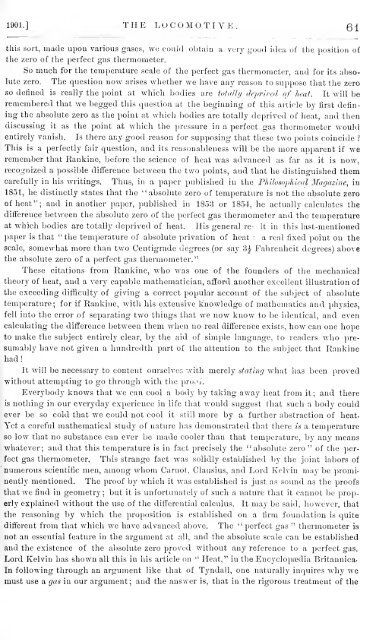The Locomotive - Lighthouse Survival Blog
The Locomotive - Lighthouse Survival Blog
The Locomotive - Lighthouse Survival Blog
Create successful ePaper yourself
Turn your PDF publications into a flip-book with our unique Google optimized e-Paper software.
1901.] THE LOCOMOTIVE. Ql<br />
this sort, made upon various gases, we could obtain a very good idea of the position of<br />
the zero of the perfect gas thermometer.<br />
So much for the temperature scale of the perfect gas thermometer, and for its abso-<br />
lute zero. <strong>The</strong> question now arises whether we have any reason to suppose that the zero<br />
so denned is really the point at which bodies are totally deprived of heat. It will be<br />
remembered that we begged this question at the beginning of this article by first defin-<br />
ing the absolute zero as the point at which bodies are totally deprived of heat, and then<br />
discussing it as the point at which the pressure in a perfect gas thermometer would<br />
entirely vanish. Is there any good reason for supposing that these two points coincide ?<br />
This is a perfectly fair question, and its reasonableness will be the more apparent if we<br />
remember that Rankine, before the science of heat was advanced as far as it is now,<br />
recognized a possible difference between the two points, and that he distinguished them<br />
carefully in his writings. Thus, in a paper published in the Philosophical Magazine, in<br />
1851, he distinctly states that the "absolute zero of temperature is not the absolute zero<br />
of heat"; and in another paper, published in 1853 or 1854, he actually calculates the<br />
difference between the absolute zero of the perfect gas thermometer and the temperature<br />
at which bodies are totally deprived of heat. His general re- It in this last-mentioned<br />
paper is that " the temperature of absolute privation of heat j a real fixed point on the<br />
scale, somewhat more than two Centigrade degrees (or say 3£ Fahrenheit degrees) above<br />
the absolute zero of a perfect gas thermometer."<br />
<strong>The</strong>se citations from Rankine, who was one of the founders of the mechanical<br />
theory of heat, and a very capable mathematician, afford another excellent illustration of<br />
the exceeding difficulty of giving a correct popular account of the subject of absolute<br />
temperature; for if Rankine, with his extensive knowledge of mathematics and physics,<br />
fell into the error of separating two things that we now know to be identical, and even<br />
calculating the difference between them when no real difference exists, how can one hope<br />
to make the subject entirely clear, by the aid of simple language, to readers who presumably<br />
have not given a hundredth part of the attention to the subject that Rankine<br />
had!<br />
It will be necessary to content ourselves with merely stating what has been proved<br />
without attempting to go through with the proof.<br />
Everybody knows that we can cool a body by taking away heat from it ; and there<br />
is nothing in our everyday experience in life that would suggest that such a body could<br />
ever be so cold that we could not cool it still more by a further abstraction of heat.<br />
Yet a careful mathematical study of nature has demonstrated that there is a temperature<br />
so low that no substance can ever be made cooler than that temperature, by any means<br />
whatever; and that this temperature is in fact precisely the "absolute zero" of the per-<br />
fect gas thermometer. This strange fact was solidly established by the joint labors of<br />
numerous scientific men, among whom Carnot, Clausius, and Lord Kelvin may be promi-<br />
nently mentioned. <strong>The</strong> proof by which it was established is just as sound as the proofs<br />
that we find in geometry ; but it is unfortunately of such a nature that it cannot be prop-<br />
erly explained without the use of the differential calculus. It may be said, however, that<br />
the reasoning by which the proposition is established on a firm foundation is quite<br />
different from that which we have advanced above. <strong>The</strong> "perfect gas " thermometer is<br />
not an essential feature in the argument at all, and the absolute scale can be established<br />
and the existence of the absolute zero proved without any reference to a perfect gas.<br />
Lord Kelvin has shown all this in his article on " Heat," in the Encyclopaedia Britannica.<br />
In following through an argument like that of Tyndall, one naturally inquires why we<br />
must use a gas in our argument ; and the answer is, that in the rigorous treatment of the
















